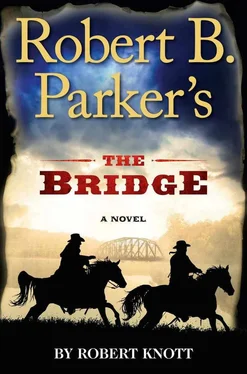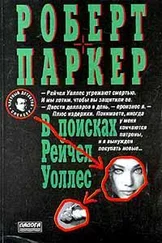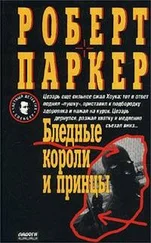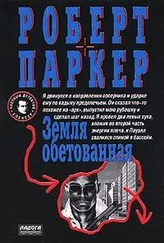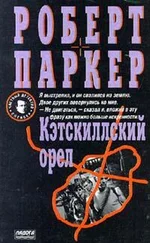Virgil looked to Book.
“Any news from Driskill, from the bridge?”
Book shook his head.
“Nope,” Book said. “Nothing, Marshal.”
“Peculiar. Awful peculiar,” I said.
The dark clouds Virgil and I had watched coming in behind the Beauchamp Brothers Theatrical Extravaganza had settled in over Appaloosa to stay.
It had been rainy and dark for three solid days and each day grew darker, colder, and wetter than the previous. The streets were muddy from boardwalk to boardwalk and in some places they were completely covered up with water.
I stood under the awning of a drilling office near the park where the troupe was camped. I mulled over the idea of moseying over and knocking on the trailer door of Madame Séraphine Leroux’s trailer, but I talked myself out of the notion.
The troupe hadn’t had a chance to set up their tent, and if they had it was doubtful there’d be much of an audience for the show with the weather like it was. It was cold out now, and with the temperature continuing to drop, it seemed certain the rain would be turning to snow soon.
I walked back to a billiard place I like to visit now and again called The Racket on Fifth Street.
I played a few games of straight with some Irish fella that had stopped over in Appaloosa hoping the weather would clear before he continued his travels south. After I took him of a few dollars he left and I started up a series of yellow ball, red ball with the skinny old talkative court clerk named Curtis Whittlesey. The Racket was normally a quiet establishment, but because Curtis liked to talk and then talk some more, it wasn’t as pleasantly peaceful as I liked.
It was hard for Curtis to let silence linger too long, but he was a fair player, so I put up with him.
“Millicent is from Milwaukee,” Curtis said. “You ever met anyone from Milwaukee, Everett?”
Curtis didn’t give me time to answer. In fact, I don’t think he gave a shit whether I’d ever met anyone from Milwaukee or not.
“Folks from Milwaukee are different,” Curtis said. “Take Millicent, for example. You know what she does every Tuesday, Thursday, and Saturday?”
Curtis answered for me.
“Daybreak, she walks around this town three times. All the way around Appaloosa, three times, every Tuesday, Thursday, and Saturday. Says it helps her connection joints and constitution. Ha. Constitution, hell. Helps me that she’s out of the damn house and I have some morning peace and quiet. I’ll tell you something, Everett, peace and quiet is damn sure a hard commodity to come by these days. ’Course, Millicent hasn’t been out of the house since this weather set in, so it just been... well, it’s been downright suffocating.”
“Your shot,” I said.
“Oh,” Curtis said.
Curtis chalked his stick, leaned over the table, and lined up a shot.
“You’re yellow.”
“Oh,” Curtis said. “Yes.”
Curtis surveyed his options and lined up his shot on a yellow ball. He planted his tongue firmly between his teeth, stroked his pool cue a few strokes, took his shot and missed.
“Shit,” Curtis said. “Weather’s fault, Everett. Bad goddamn weather.”
“No doubt,” I said, as I walked around the table.
“I tell you, it is just plain goddamn bad,” Curtis said. “Millicent hasn’t been to the coops because of the damn puddle behind the house in two days. I told her when we built we should have put the foundation on higher ground but she wouldn’t listen to me. I told her all them chickens would most likely drown before this was all over.”
Curtis kept talking as I lined up a shot in the corner pocket, and made it. I put good inside low English on it and brought the cue ball back just exactly where I wanted it and lined up my next red ball.
My time at West Point was not entirely wasted on learning soldiering. I spent many of my off days shooting call shot and carom, and made myself into a pretty fair hand around the felt.
“Good shot,” Curtis said, and then went directly back into his ramble about the rain, his house, and his wife.
The door opened and deputy Skinny Jack entered, wearing his wet oilskin slicker. He removed his rain-soaked derby.
“Excuse me, Mr. Whittlesey... um, Deputy Marshal Hitch?” Skinny Jack said, looking to me as he pulled water from his scruffy goatee. “Western Union operator Charlie Hill brought over a wire just now for Marshal Cole.”
“’Spect he’s at the house, Skinny Jack.”
“I figured I’d find you first.”
“What is it?”
“From the way station, near the bridge camp,” Skinny Jack said, as he turned his hat nervously.
“Sheriff Driskill find Lonnie?”
Skinny Jack shook his head.
“Something bad has happened,” Skinny Jack said.
“What?” I said.
“Some people have been killed.”
Skinny Jack looked to Curtis, then back to me.
“Go on,” I said.
“There was an attack at the Rio Blanco Bridge.”
“What kind of attack?”
“The bridge... has been... blown up.”
“Good God,” Curtis said.
“What?”
Skinny Jack nodded.
“Why on earth?” Curtis said.
Skinny Jack shook his head.
“Don’t know. That’s what the telegram said. Somebody blew up the bridge. I left the wire in the office on account I didn’t want to get it all wet and smudge out what was on it, but the bridge was blown up and some people were killed.”
“When?”
“Two days back,” Skinny Jack said.
“And this telegram was just received?” I said.
Skinny Jack nodded.
“Note said the wire had been cut,” Skinny Jack said. “I suspect it took that long to find the break, fix it. I don’t know. All I know is what was on the wire.”
“Good God,” Curtis said again.
“Wire from Sheriff Driskill?” I said.
“No,” Skinny Jack said. “It was from the way station operator.”
“Where are Sheriff Driskill and the other deputies, Karl and Chip?” I said.
“No word,” Skinny Jack said with a gulp.
This news of the bridge disaster temporarily shut Curtis up. Silence swelled in the billiard room for a moment as the thought of what Skinny Jack said lingered.
“My God,” Curtis said. “That bridge was a massive construction. Tons of wood and iron well over two hundred feet long... my God.”
Skinny Jack nodded.
“Who was killed?” I said.
Skinny Jack just shook his head.
“Goodness,” Curtis said. “Was G. W. Cox one of them?”
Skinny Jack shook his head.
“I don’t know, the telegram didn’t say.”
“What do you know about G. W. Cox?” I said.
“He’s the Rio Blanco contractor, wealthiest man in Appaloosa these days. Was an attorney from Philadelphia, a damn fine one, but he’s in the contracting business now,” Curtis said. “His company was the one that won the territory bid to build the bridge.”
“Any back and forth with telegrams?” I said to Skinny Jack.
“No,” Skinny Jack said. “Just the one, then I came to find you. It’s just plumb awful. Two of my good friends was working there.”
“Curtis?”
Curtis looked at me, raising his nose up a bit.
“This G. W. Cox,” I said. “He live here, in Appaloosa?”
“He does,” Curtis said. “Unless he’s on the road. He travels a lot, back east.”
“He spend time at the bridge?”
“He’s the contractor, like I said, so he’s there some,” Curtis said. “At least I would imagine so.”
“You know where he is now?”
“I think he’s here,” Curtis said, “in Appaloosa, but I don’t know for certain.”
“You know where he lives?”
“Why, yes,” Curtis said. “He lives in the big house at the top of Fourth Street.”
Читать дальше
